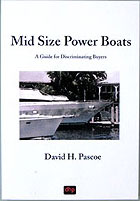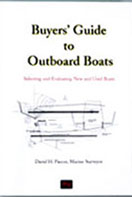Chapter 7
Excerpt
Rain is the single largest cause of small boat sinkings, sinking not only small boats but occasionally larger ones, too. This type of casualty is therefore one of the most frequent types of losses investigated by marine surveyors.
Smaller boats sink more frequently due to several factors: First by virtue of being smaller, second by being more open, and third because most do not have shore power operated battery charging systems.
There is a host of contributory factors, such as outboards and stern drive boats being unbalanced and stern heavy, as discussed in previous chapter.
Heavy rainfall also results in partial sinking, or hull flooding, including hull flooding of hauled vessels. Of course it is never expected that rainfall will sink a boat because almost everyone expects boats to be designed in such a way as that they will withstand the effects of what we consider to be normal weather.
That statement raises an interesting question: How much rainfall should a boat be expected to withstand?
Design Issues
Rain is usually not the only factor, but its combination with design issues, maintenance and system failures that causes a boat to sink. It is the rare case in which heavy rain, alone, is the sole cause.
This presents the investigator with the interesting challenge of having to assess the adequacy of both structural and systems design. For this reason this chapter will explore the wider variety of design issues that also cause boats to sink.
No matter where you live, unless perhaps, it is in the desert, all regions from time to time will receive extreme amounts of rainfall, amounts that are well above normal. How we define extreme will be dependent on what is defined as "normal" for a given area.
In this regard we should be cognizant of the fact that many, if not all, boat builders market their boats nationwide and even internationally. With that being the case, the builder has an obligation to design his product to withstand the normal range of weather of the region with the highest rates of rainfall where he markets his products.
The issue of proper design is often raised, as it was in a recent case involving a new $250,000 thirty-four footer that sank because the cockpit drainage system was improperly designed.
The boat suffered a bilge pump failure in addition to the fact that the aft deck was designed in such a way as it shed all rain water directly into the bilge.
After paying the loss, the insurer sued the builder over the faulty design and recovered based upon an investigation that left no doubt as to the cause of the sinking.
The faulty deck design was the primary cause because the boat should have been able to withstand a four inch rainfall even without bilge pumps. But the pumps did not work because the builder had improperly wired them.
Turning off the main battery switches cut power to the pumps when it is standard procedure to wire the pumps independent of this switch. This new boat owner made a habit of always turning the switches off when leaving the boat, not knowing that he was turning his bilge pumps off.
(Additional spaces are added for easy screen reading.)
Table of Contents: Chapter Chapter 7
7. Sinking Due To Rain 185
Design Issues 185
Negligence 186Levels of Causation 187
Proximate Cause 187
Primary Cause 188
Contributory Cause 188
Examples 188Rain 191
Heavy Rain 191
Catastrophes 192
Timing 192
Parameters and Profiling 193Calculations 195
Calculating Surface Areas 195
Calculating Amount of Rainfall 197
PPII 198
Threshold 198
Another Approach 199
Rainfall Rates 199Small Boats 201
Cockpit Decks 201
Cockpit Integrity 204
Cockpit Openings 205
When Cockpits Are Very Low 206
Older Outboards with or without Motor Wells 208
Old Style Motor Brackets 208
Bad Platform Design 210Mid Size Boats 211
Hatch Cross-Beams or Supports 211
Hatch Gutters 211
Drainage System Integral with Deck 212
Scuppers and Channels 213
Watersheds 214Waterlines 216
Boat Load 216
Telltale Evidence 216
Old Versus New Water Lines 217Detecting Prior Damage 218
Prior High Water Damage 218
Prior Incidents 219
| Expand Business! |
|---|
| Marine
surveyors: Expand your marine business! Conducting marine investigations can help free you from the limitations of a seasonal business and expand your business opportunities and income. |
| Who Hires? |
| Who
hires marine investigators? In addition to insurance companies, specialist investigators merge their specialized pleasure craft knowledge with investigative abilities for a broad range of clientele. |
| Clientele |
| These
can range from boat owners with serious warranty claim disputes and
faulty repair issues to being hired by lawyers as investigators as
either fact witnesses or expert witnesses. Marine investigators often work for boat owners who are having trouble with insurance claim issues, assisting the boat owner obtain a proper claims settlement. |
by David H. Pascoe
Soft Cover
544 pages
Publisher: D. H. Pascoe & Co., Inc.
Published: 2004
Language: English
ISBN-10:0965649652
ISBN-13: 9780965649650
In Stock
HOME >
David Pascoe - Biography
David Pascoe is a second generation marine surveyor in his family who began his surveying career at age 16 as an apprentice in 1965 as the era of wooden boats was drawing to a close.
Certified by the National Association of Marine Surveyors in 1972, he has conducted over 5,000 pre purchase surveys in addition to having conducted hundreds of boating accident investigations, including fires, sinkings, hull failures and machinery failure analysis.
Over forty years of knowledge and experience are brought to bear in following books. David Pascoe is the author of:
- "Mid Size Power Boats" (2003)
- "Buyers’ Guide to Outboard Boats" (2002)
- "Surveying Fiberglass Power Boats" (2001, 2nd Edition - 2005)
- "Marine Investigations" (2004).
In addition to readers in the United States, boaters and boat industry professionals worldwide from over 70 countries have purchased David Pascoe's books, since introduction of his first book in 2001.
In 2012, David Pascoe has retired from marine surveying business at age 65.
On November 23rd, 2018, David Pascoe has passed away at age 71.





